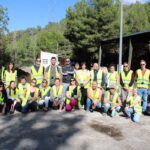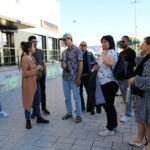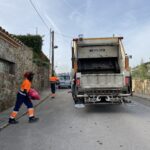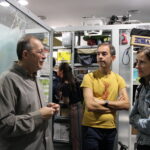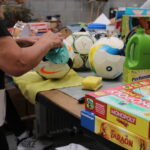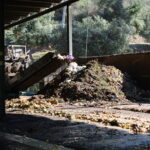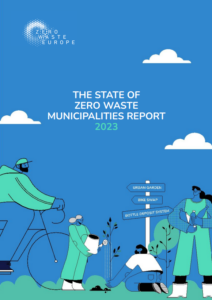
#MeetTheTeam – Manon Jourdan
It’s time to discover and learn more about the people behind Zero Waste Europe’s work and magic! In addition to the ZWE Changemakers series, where you can learn more about our member organisations, we invite you to get a closer look at our staff, what they do, and what inspires them to work for a zero waste future.
This time, we sat down with Manon Jourdan, our Implementation Officer, who has been at Zero Waste Europe since March 2023.
How did you come to join Zero Waste Europe?
Before embarking on my journey to zero waste, I worked on migration-related projects for many years, first in France and then in Berlin, where I was involved in providing support to refugee and migrant families. With the escalation of the triple planetary crisis and the consequent environmental inequalities, I began to look at migration from an intersectional perspective.
I quickly realised that only a just ecological and social transition, rooted in sufficiency, would enable humanity to share resources equitably and sustainably among populations. Zero waste (not as a lifestyle objective, but rather as a systemic change) appeared to me as one of the guiding principles of such transition.
I began working for Zero Waste Lab, a local NGO in Portugal, started a new master’s degree on the sustainable development of rural and urban territories with a circular economy focus, specialised in waste prevention policies, and became more and more familiar with the work of Zero Waste Europe (being indeed a reference in the field).
In 2021, I was lucky enough to take part in the very first Zero Waste Ambassador training course in Slovenia, organised by the Let’s Do It Foundation in collaboration with Zero Waste Europe, and to meet an “army” of zero wasters from all corners of Europe. It was then I realised the power of such a network, bringing together activists and experts from different national contexts. Almost two years later, here I am!
What motivated you to work for better implementation of zero waste strategies at the local level?
I have been deeply influenced by my experience working and volunteering with various grassroots organisations over the last 10 years. Through these experiences, I’ve realised the incredible potential of local groups and communities as catalysts for meaningful, transformative change.
One particularly inspiring local success story is the one of the “Eco-estilistas“, a local association from Lisbon. This initiative was born in one of the city’s most economically challenged neighborhoods, grappling with severe urban hygiene and waste issues back in the late 1980s. Against all odds, a group of six women and mothers banded together to address the issue. They launched an informal movement and started raising awareness by collecting litter from the streets and ingeniously repurposing it into pieces of art.
What started as a humble effort has, over three decades, evolved into a thriving community organisation. The once-littered streets are now clean and their legacy lives on, passed on to the younger generation, who has grown up with a heightened consciousness of the waste problem and continue to raise public awareness of the issue.
However, while the impact of grassroots initiatives is invaluable and should be better supported and recognised, I believe that municipalities can be powerhouses of innovation and transformation in waste management and prevention policies. The implementation of efficient waste sorting, door-to-door collection with Pay-As-You-Throw (PAYT) systems, city-wide packaging reuse programs, reuse centers, economic incentives for bulk shopping, and community composting projects can bring about substantial change.
While municipalities must create the right framework, change must go beyond the actions of public authorities and not depend solely on them.
Indeed, we are witnessing a plethora of innovative initiatives by local civil society organisations aimed at democratising zero waste models: repair cafés, object libraries, exchange markets, reuse centres etc. However, these promising local initiatives are still struggling to move beyond the experimental phase and scale up.
Such a transformation would require an appropriate regulatory framework, greater support from public authorities and a more collaborative, horizontal approach to governance. We’re not quite there yet… but we’re working on it.
What would you say is the most interesting part of your job?
Definitely working with the members of Zero Waste Europe. It’s like having hundred extra eyes and arms! Each member has their own area of work and expertise, local projects and campaigns. We learn a lot from them, and that’s an incredible opportunity for the sustainability and legitimacy of our movement.
To give you a concrete example of what I mean, I’m currently coordinating a European project called Elevating Reuse in Cities (ERIC), which aims to fight plastic pollution and develop local plastic prevention plans in 10 EU member states with the help of 10 of our members. These plans will focus on preventing the production of plastic waste at the municipal level through the adoption of a series of measures, ranging from reuse at public events, innovative public procurements, to the obligation to ban all single-use plastics in public buildings.
After 9 months of the project, it’s been really interesting to see what’s been possible to achieve or not in each participating city, depending on local and national regulations and contexts. In other words, there is no one-size-fits-all solution – and it would be wrong to pretend otherwise. That’s precisely the strength of a European project of this kind, which will enable us to pool the lessons learned from different contexts and propose a set of different implementation strategies for any given local waste prevention policy.
What are the biggest challenges that you face in your work?
I think the legitimacy of the zero waste movement depends on our ability to properly assess what waste prevention and reuse policies are the most effective, how to implement them, and in which contexts. Such work requires the ability to imagine new approaches, encompassing not only economic but also socio-cultural aspects.
It’s difficult – as we’re still trapped in a linear model based on the illusion of constant economic growth – but it’s essential, not only to reduce waste production and the pollution and impact associated with it, but also to reduce our material footprint.
Yet, we tend to focus all our efforts on the waste management part. This is of course very important (and there’s quite a lot of work to be done in this area), but I feel that our society still lacks imagination when it comes to tackling the root causes of the waste problem. Governments and industries spend considerable effort, time and money on technical solutions, rather than re-evaluating the wastefulness of our production and consumption systems.
In my view, one of the most significant challenges is therefore, how to effectively transform mindsets within local, regional, and national authorities, so they genuinely commit to prioritising policies centered on waste prevention and resource preservation.
That’s why our implementation work at the local level, through the Zero Waste Cities Certification and current projects like ERIC or the ReuSe Vanguard Project (RSVP), is so important, because cities with dedicated zero waste strategies could very well be the places where these transformative changes can take off.
Yet, to achieve such a goal, critical questions need to be answered:
- How can we move from a model based on relentless growth and excessive consumption to one that meets human needs and ensures wellbeing, while respecting planetary boundaries?
- What regulations and concrete measures should be implemented to prevent waste production and preserve Earth’s vital resources?
- How can we modify production and consumption patterns, manufacturing processes, product design and social behavior without creating further social inequalities?
What is an aspect of your work that you find fun?
I recently coordinated Zero Waste Europe’s annual Study Tour for the first time: we spent three days in Barcelona, visiting some of the best practices in the Catalonia region, with a focus on reuse, waste prevention as well as bio-waste separate collection and treatment. We had such a diverse group of experts, coming from all corners of Europe (and beyond). I found the experience very enriching for exactly this reason – the opportunity it gave us all to connect with each other and learn from our different realities.
Creating the most engaging and useful events possible is certainly something I’ll be trying to do more and more often in my work. I sincerely believe that nothing beats a good “hands-on experience” to get inspired and truly learn.
Photos from ZWE’s Study Tour 2023 in Barcelona
In your view, which actions are needed to get all cities and municipalities across Europe to adopt zero waste strategies?
Cities need to create the right conditions for waste prevention to progress beyond the experimental phase. We need more ambitious local regulations to create the right framework. The crucial step for cities and municipalities is to enact and implement strong waste prevention policies with concrete actions and targets for reducing waste and material footprint (as some cities have already done) while implementing financial incentives, so the right solutions are supported.
Additionally, there’s a need for increased investment in communication and awareness-raising initiatives, often overlooked. Convincing citizens and businesses of the importance and benefits of zero waste policies requires widespread dissemination of knowledge and sharing of success stories from local zero waste initiatives. No matter how effective a solution may be, without proper communication, you will convince only a few.
Another central step is to invest in the right infrastructures and systems: door-to-door separate collection systems for all recyclables, bio-waste recycling facilities, centers dedicated to reuse and repair. Accessible infrastructures and the right economic incentives play a key role in promoting proper waste sorting, facilitating recycling and composting initiatives, while also significantly increasing the amount of products being reused and repaired locally.
Ultimately, cities need to embrace a more inclusive approach to governance, dialoguing and collaborating more with civil society organisations, citizens’ groups, and businesses. By gaining a comprehensive understanding of the various zero waste initiatives and projects within their territory – community composting projects, repair workshops, library of things, second-hand shops, food waste prevention programs – local authorities can effectively leverage existing resources and opportunities. This involves establishing the right connections among stakeholders, providing material, financial and logistical support where needed, for scaling up promising projects and maximizing their impact locally.
Looking ahead, which developments or priorities will you be focusing on in your work?
One of my primary objectives is to assist local authorities in identifying actionable measures that can be implemented at the city level, showcasing practical steps and successful strategies to prevent waste and reduce material footprint. I strongly believe that there is a pressing need for such guidance to elevate the level of ambition across the European Union – as we still lack a clear vision on the topic. Projects such as Elevating Reuse in Cities (ERIC) or ReuSe Vanguard Project (RSVP) serve as great starting points, as they demonstrate that change is within the grasp of municipalities.
I am also involved in the LIFE BIOBEST project, where I am mainly focusing on promoting the dissemination of best practices in bio-waste separate collection and recycling through events. With the imminent EU obligation mandating to separate bio-waste at its source starting 1 January 2024, there is an urgent need to share these success stories with local authorities that are still lagging behind. We must ensure that the most effective bio-waste separate collection systems will be set up in EU municipalities, drawing lessons from pioneers in the field while avoiding the repetition of past mistakes. To do this, we must maximise bio-waste collection rates while minimising impurities levels. This is absolutely crucial to produce high-quality compost and enhance soil fertility.
Want to learn more about Manon and her work? You can reach out to her at [email protected]
